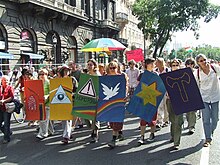Homosexuality in Hungary

When it comes to homosexuality, Hungary isconsidered a more liberal Central European country. There has been an unregistered partnership for same-sex couples in Hungary since 1996.
legality
The first Hungarian penal code of 1878 punished homosexual acts between men (“természet elleni fajtalanság”) with imprisonment for up to one year. Homosexuality was decriminalized for men over the age of 20 in 1961. In 1978 the age of consent was lowered to 18 years by the new penal code. Since 2002 homosexuality has been put on an equal footing with heterosexuality and the age of consent has been adjusted to 14 years as a result of a supreme court decision by the Hungarian Constitutional Court. Homosexual people can serve in the army.
In April 2012, the right-wing extremist Jobbik party brought two legislative proposals to parliament, according to which homosexuals who make their sexuality a topic or reveal it in public can be punished with up to eight years in prison. The applications also include a ban on operating gay bars and clubs, holding CSDs and similar festivals, and positively portraying gays and lesbians in the media.
Anti-discrimination laws
In 2000 the Hungarian Constitutional Court ruled that the Hungarian Constitution also covers the protection of sexual orientation . An anti-discrimination law has been in place at the legal level since 1997 through the Act on Public Health . In 2003, the Act on Equal Treatment and the Promotion of Equal Opportunities was passed , prohibiting discrimination based on sexual orientation in employment, education, property, healthcare, and access to goods and services. The law was issued as an implementation of the anti-discrimination legislation of the European Union .
Recognition of same-sex partnerships
Since 1996 same-sex couples can enter into an unregistered partnership, which is recognized by the Hungarian state. No entry is made here. The couples receive some special rights and perks.
In November 2007, the government under Ferenc Gyurcsány introduced a law into the Hungarian parliament that would have made registered partnerships possible, which, except for the right of adoption, would have been identical to marriage and would also have been open to heterosexuals. The then left or liberal ruling parties supported the law, with the liberal party seeing it as a first step towards a complete opening of marriage.
However, the draft bill could not come into force on January 1, 2009 as planned, since, according to the interpretation of the Hungarian Constitutional Court, it violates the constitutional protection of marriage and family because the law would also have been open to heterosexual couples. However, a bill only for same-sex partnerships would be constitutional. The Hungarian Parliament implemented the requirements of the Constitutional Court in April 2009 with a law on the approval of registered civil partnerships , which came into force in July 2009. The law grants partner couples largely the same rights as married couples, but excludes the possibility of adopting children.
Since Viktor Orbán's conservative party came to power in 2010, the legal situation for homosexuals has not improved any further. In 2013, a constitutional amendment specifically restricted family protection to heterosexual couples.
On June 5, the European Court of Justice ruled on the action brought by a Hungarian citizen who married his American partner in Brussels. Hungary denied the American a right of residence for more than three months. The European Court of Justice ruled that the term “spouse” should be considered gender-neutral and that same-sex spouses should be granted a right of residence. Otherwise the Hungarian would be restricted in his freedom of movement according to Art. 21 (1) TFEU to work in another member state of the Union, to enter into a same-sex marriage and to live it in his home country.
Social situation
A homosexual community can be found primarily in the capital Budapest , where a CSD takes place every year . However, there were several violent counter-protests here. The EuroGames took place in the summer of 2012 without incident.
Support for same-sex marriage has risen sharply in recent years: in 2006, only 18% of the population were in favor of equality in marriage law; in 2015 it was 39%.
See also
Web links
- Shibu Thomas: Hungary Bans Trans People From Legally Changing Gender. In: StarObserver.com.au. May 20, 2020 (English; "the Hungarian Parliament has voted to ban trans and gender diverse persons from changing the gender assigned to them at birth in official documents").
- Judit Takács: Social visibility and acceptance of LGBT people in Hungary. In: policy.hu. 2004 (English; detailed paper).
- Andreas Bock: We have to stay outside. ( Memento from December 22, 2009 in the Internet Archive ) In: the-international-online.com. September 7, 2009 (via the CSD 2009: Budapest Pride in camera).
Individual evidence
- ↑ Announcement: Russian conditions in the EU? Hungary: Jobbik wants to criminalize gays and lesbians. In: Queer.de. April 12, 2012, accessed May 23, 2020.
- ^ Announcement: Hungary: Court bans registered partnerships. In: Queer.de. December 16, 2008, accessed May 23, 2020.
- ↑ Federal Agency for Civic Education : Hungary's parliament passes far-reaching constitutional amendments. In: bpb.de. March 12, 2013, accessed May 23, 2020.
- ↑ Press release of the Court of Justice of June 5, 2018 (PDF, 222 kB)
- ^ Judgment of the Court of Justice of June 5, 2018
- ↑ Message: Court: CSD in Budapest may take place. In: Queer.de. April 13, 2012, accessed May 23, 2020.
- ↑ Chris Karnak: EuroGames in Budapest ended without incident. In: GGG.at. July 2, 2012, accessed May 23, 2020.
- ↑ European Commission : Special Eurobarometer 437: Discrimination In The Eu In 2015. Report. European Union , October 2015, ISBN 978-92-79-50342-9 , p. ?? (English; PDF: 14.2 MB, 396 pages on equineteurope.org ( Memento from January 22, 2016 in the Internet Archive )).
